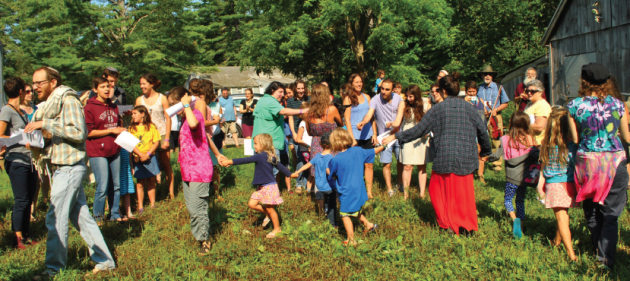Tag : singing
January 26, 2021 by Jen Gubitz
Debbie Friedman Helped Me Find My Voice
On January 28 at 8PM, Join Hebrew Union College’s Jewish Institute of Religion for Sing Unto God, a virtual event to commemorate Debbie Friedman’s legacy on the occasion of her 10th Yahrzeit. Register here.
With my long, curly, mop of dark hair, I’m buckled up in the back seat of our blue ‘86 Oldsmobile Cutlass Ciera. I can’t wait. Today, it’s just me and my mom on our way to Indiana University in Bloomington. Not only are we going to eat cookies the size of our faces while my mom tells me stories of how she met my dad, but Debbie Friedman has come to give a concert.
The summer before, I spent weeks at my day camp, making up a dance to “Miriam’s Song.” We wear flowing skirts, shake tambourines, and we dance over and over again. I am a tiny feminist bringing Miriam to life, even though I don’t know what feminism is.
Music is a love language in our family; and I’m only eight when my Bubbe, the original source of music in our family, dies. This first great loss leaves me sad and withdrawn, twitchy and morbid. This trip with my mom, a musical genius in her own right, feels the closest to normal it’s been in a while. We know all the words to every song on “You Shall Be a Blessing,” and it’s in the cassette deck while we drive.
- No Comments
April 20, 2020 by admin
Let My People Sing

photo: ©let my people sing!, www.letmypeoplesing.org.
There’s a Hasidic story about a man who lived in Poland, renowned across the country for the fervor of his prayers. After the Baal Shem Tov made a long journey to see him, he found a shepherd boy standing on a hilltop, calling out letters one by one. “Bet! Reish! Vav!” he cried out, on and on, and then, “Master of the Universe, this is all I can do. Please, arrange the letters in the proper way.” When I first heard this story, I recognized in it those of us filled with a hunger to express ourselves, to cry out in prayer, and to contribute, but who didn’t start out knowing how to piece the letters together—metaphorically or literally. I’ve devoted my rabbinate to creating spaces where people like me, like this fabled shepherd boy, can access Jewish tradition and thrive. As it turns out, one key to finding that space is through music. Five years ago, five friends—Margot Seigle, Batya Levine, Ilana Lerman, Noam Lerman, and myself—came together to run a weekend-long retreat dedicated to sharing and singing Jewish music, called Let My People Sing! (LMPS). The project began as an experiment. We imagined that 50 people might join us. Instead, 150 people signed up that first summer, and gathered in the woods of Connecticut to sing. We sang in Hebrew, Ladino, Yiddish, Arabic, Aramaic, English, Spanish—wherever Jews have dwelled in diaspora, we sang, and shared all that we knew from these lineages. These days, I’m no longer surprised that interest has bloomed beyond what we had imagined. Music is medicine. Music has the ability to free and heal the soul. Of course, this belief is in no way unique to LMPS, and is in fact our shared cultural inheritance. But because so many of us have lost access to our traditions, we created LMPS as a place where people could reclaim them. At LMPS, everyone can be a leader and a learner of song. We start from the assumption that building community should be an intergenerational and radically inclusive project, one that thrives through our differences, including religious and political. We aim to foster a culture of love, so that participants feel safe and encouraged to take risks, develop new skills, and try out new forms of leadership. On Shabbat afternoon during the retreat, one can wander around and hear the floating music of many song circles at once: Baghdadi-Indian Melodies of Shabbat; Songs for All Sorts of Survivors; Yiddish Songs About Moshiach; Syrian Piyyutim; How to Engage Children in Song— just to sample a handful. Many of us long to restore broken lineages of cultural transmission, hungering to sing the music of our ancestors lost to us through centuries of migration, persecution, and assimilation. We also sing original songs created by Jewish artists and cultural activists today. MÓNICA GOMERY, ““How Singing (Yes, Singing!) Can Create Radical Jewish Accessibility” The Lilith Blog.
- No Comments
 Please wait...
Please wait...